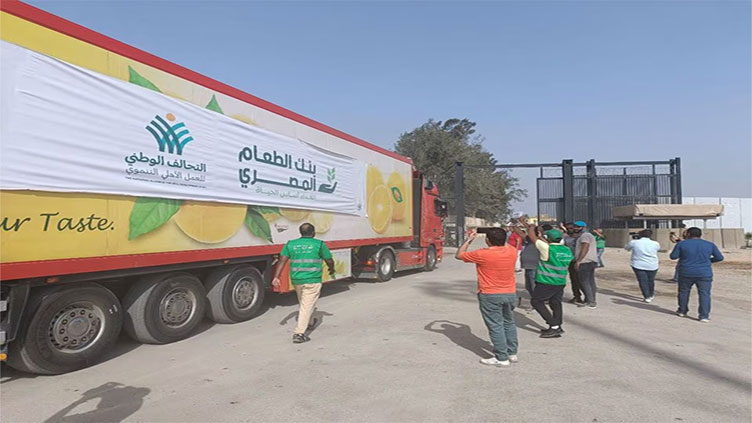Second aid convoy enters Gaza Strip from Egypt - UN official

World
A second convoy of 14 aid trucks entered the Rafah crossing from the Egyptian side.
CAIRO (Reuters) - A second convoy of 14 aid trucks entered the Rafah crossing from the Egyptian side to the besieged Gaza Strip on Sunday night, Juliette Touma, director of communications at the U.N. Relief and Works Agency (UNRWA), told Reuters in Gaza by phone from Amman.
Witnesses reported a blast and ambulance sirens on the border earlier.
Israel's military said one of its tanks accidentally hit an Egyptian position near the border with the Gaza Strip.
Several Egyptian border guards sustained minor injuries after being hit by fragments of an Israeli tank shell, a spokesperson for the Egyptian army said.
A witness and a medical source said seven people were wounded and taken to hospital.
Israel's defence force "expresses sorrow regarding the incident, which is being investigated," it said in a statement, giving no further details.
There were a total of around 19 trucks in Sunday's convoy carrying medical and food supplies, the security and humanitarian sources said.
A first convoy of 20 trucks of badly-needed supplies had entered Gaza on Saturday through Rafah, which had previously been out of operation after bombardments hit on the Gaza side of the border and amid wrangling over conditions for delivering aid.
Distribution of those supplies began on Sunday, but aid officials are still warning of a humanitarian disaster as supplies of food, water and fuel run low.
Israel imposed a total blockade and launched air strikes on Gaza in response to a deadly attack on Israeli soil by Hamas on Oct. 7.
The Rafah crossing, the main entry and exit point to Gaza that does not lead to Israel, has become the focus of a push to deliver aid as humanitarian conditions in Gaza worsen.
U.N. officials say at least 100 trucks a day would be required in Gaza to cover urgent needs. Before the outbreak of the most recent conflict, several hundred trucks had been arriving in the enclave daily.
U.N. humanitarian chief Martin Griffiths told Reuters on Saturday that work was under way to develop a "light" inspection system, whereby Israel could check the shipments but ensure a sustained flow.


